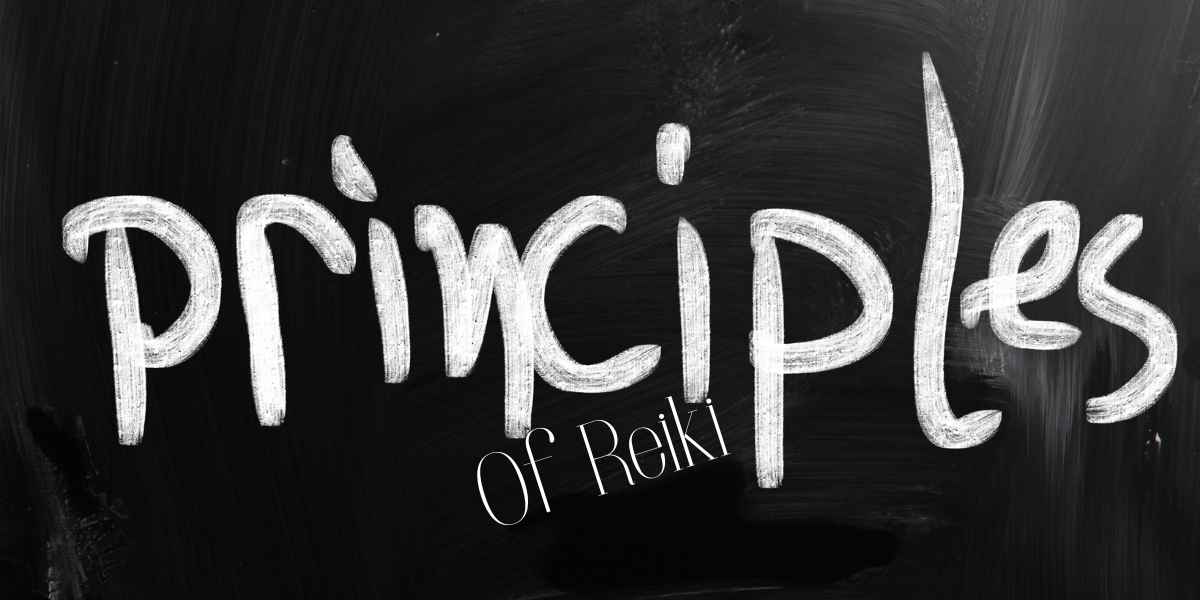Welcome to the enriching realm of Reiki, a spiritual discipline that fosters well-being and natural healing. Originating from Japan, Reiki is a healing modality that interacts with the energy fields enveloping the body. The brainchild of Mikao Usui, Reiki has now found global acceptance, with practitioners ranging from seasoned Reiki masters to ordinary individuals striving for equilibrium and wellness.
At the heart of Reiki lies a set of guiding tenets, often referred to as the five principles of Reiki or the 5 principles of Reiki. These principles serve as spiritual beacons, guiding you towards a life that is more balanced and filled with joy.
Here’s a brief overview of these principles:
- First Principle: Just for today, I will not be angry. This principle encourages us to release angry energy and to live in the present moment, free from anger.
- Second Principle: Just for today, I will not worry. This principle reminds us to let go of worry energy, especially about things that haven’t happened yet.
- Third Principle: Just for today, I will be grateful. This principle encourages us to acknowledge our many blessings and to practice gratitude daily.
- Fourth Principle: Just for today, I will do my work honestly. This principle encourages personal growth and integrity in all that we do.
- Fifth Principle: Just for today, I will be kind to every living thing. This principle reminds us to be gentle with others and to practice compassion.
These principles are not just for Reiki practitioners; they’re for anyone seeking to bring a positive flow in their life. They’re affirmations or intentions that you can use to start your day, helping to set a positive tone and to encourage personal and spiritual growth.
In the following sections, we’ll delve deeper into each of these principles, exploring their origins, their practical applications, and how they can contribute to health and wellbeing. Whether you’re a seasoned Reiki master, a beginner in the practice of Reiki, or simply someone interested in spiritual healing and personal growth, there’s something here for you. So, let’s look at the principles of Reiki and see how they can help you lead a happier, more balanced life.
Origins of the Five Reiki Principles
The five principles of Reiki, also recognized as the 5 Reiki principles, form the fundamental tenets of the Reiki practice. These were conceived by Mikao Usui, the originator of Usui Reiki, as an uncomplicated approach for fostering spiritual and personal growth.
These principles transcend the realm of mere rules to abide by. Instead, they function more as mantras or affirmations, guiding your daily thoughts and actions. They are meticulously crafted to aid you in releasing thoughts of worry and anger, thereby fostering a positive flow in your life.
Here’s a bit more about the origins of each principle:
- Just for today, I will not be angry: This principle is about acknowledging and releasing angry energy. It’s not about suppressing anger, but rather recognizing it, accepting it, and then letting it go. It’s a reminder that anger hurts us more than it helps, and that every day is a new opportunity to choose peace over anger.
- Just for today, I will not worry: This principle encourages us to live in the present moment. Worry is often about the future, about things that haven’t happened yet. By releasing worry energy, we can focus more fully on the here and now.
- Just for today, I will be grateful: Gratitude is a powerful force for positivity. This principle encourages us to think about the times we’ve been blessed and to express gratitude for them. It’s a way to shift our focus from what’s wrong to what’s right in our lives.
- Just for today, I will do my work honestly: This principle is about integrity and authenticity. It’s a reminder that honesty in all things, including our work, contributes to a happier life and a higher self.
- Just for today, I will be kind to every living thing: This principle is about compassion and love. It’s a reminder that kindness to others is also a kindness to ourselves. It’s a way to spread light and love in the world.
These principles are meant to be practiced daily, as part of your Reiki daily routine. They’re simple, yet powerful, and can have profound effects on your health and well-being. Whether you’re a seasoned Reiki practitioner or new to the practice, incorporating these principles in your daily life can lead to significant personal growth and a deeper sense of peace and happiness.

Detailed Exploration of the 5 Reiki Principles
Having explored the origins of the five principles of Reiki, let’s delve further into each one. Keep in mind, these principles aren’t exclusive to Reiki practitioners; they’re for anyone desiring to infuse a positive flow into their life. These principles serve as affirmations or intentions that you can incorporate at the start of your day, assisting in setting a positive tone and fostering personal and spiritual growth.
- Just for today, I will not be angry: This principle is all about releasing angry energy. It’s normal to feel angry sometimes, but it’s what we do with that anger that matters. Instead of letting it control us, we can acknowledge it, feel it, and then let it go. This principle encourages us to choose peace over anger, promoting a higher level of healing and wellbeing.
- Just for today, I will not worry: Worry is a natural part of life, but it can also be draining. This principle encourages us to release worry energy and to focus on the present moment. Instead of worrying about things that haven’t happened yet, we can choose to live in the moment and to trust in the process of life.
- Just for today, I will be grateful: Gratitude is a powerful force that can shift our perspective and bring more positivity into our lives. This principle encourages us to focus on our blessings, no matter how big or small. By practicing gratitude daily, we can cultivate a more positive outlook and a happier life.
- Just for today, I will do my work honestly: Honesty is a cornerstone of integrity and authenticity. This principle reminds us to be true to ourselves in all that we do, including our work. By doing our work honestly, we can achieve a higher level of satisfaction and fulfillment.
- Just for today, I will be kind to every living thing: Kindness is a universal language that everyone understands. This principle encourages us to practice kindness towards others and ourselves. By spreading kindness, we can contribute to a more compassionate and loving world.
Remember, these principles are meant to be practiced daily. They’re simple, yet powerful tools for personal and spiritual growth. By incorporating these principles into your daily life, you can experience the positive effects of Reiki, even if you’re not a Reiki practitioner. So, why not give it a try? Just for today, choose to live by these principles and see how they can bring about positive changes in your life.
Secular Nature of Reiki Principles in Your Daily Life
One of the beautiful aspects of the five principles of Reiki is their universal appeal. These principles transcend religious and spiritual beliefs, making them accessible and beneficial to everyone, regardless of their faith or philosophical leanings.
The Reiki principles are essentially guidelines for living a fulfilling life. They encourage us to let go of negative emotions like anger and worry, to be present in the moment, to cultivate gratitude, to work with integrity, and to spread kindness. These are universal values that resonate with people from all walks of life.
Here’s how you can incorporate these principles into your daily life:
- Start your day with the principles: First thing in the morning, take a few moments to recite the principles. This sets a positive tone for the day and helps you to keep these values at the forefront of your mind.
- Use the principles as a mantra: Whenever you find yourself feeling angry or worried, recite the relevant principle to yourself. This can help to calm your mind and shift your focus.
- Reflect on the principles at the end of the day: Before you go to bed, reflect on how you lived out these principles during the day. This can help you to see your progress and to identify areas where you might need to focus more.
- Share the principles with others: The principles can be a great conversation starter. Share them with your friends and family, and discuss how you all interpret and apply them.
Remember, the goal is not to be perfect but to make a conscious effort to live out these principles. Some days will be easier than others, and that’s okay. The important thing is to keep trying, to keep growing, and to be gentle with yourself along the way.
Reiki as a Natural Healing Technique
Reiki is more than just a spiritual practice; it’s a form of energy healing that can have profound effects on your physical, emotional, and mental health. The five principles of Reiki guide us in cultivating positive energy, but how exactly does Reiki work as a healing technique?
At its core, Reiki is about balancing the body’s energy. Practitioners believe that we all have life force energy flowing through us, and when this energy is out of balance, it can lead to illness or stress. Reiki aims to restore this balance, promoting health and wellbeing.
Here’s a closer look at how Reiki works:
- Hands-On Reiki: In a typical Reiki treatment, the practitioner places their hands lightly on or over the client’s body. The idea is that the practitioner can channel healing energy into the client, helping to balance the client’s energy.
- Distance Reiki: Some practitioners also offer distance Reiki, where they send healing energy to the client remotely. This can be an effective option for those who can’t attend a hands-on session.
- Self-Reiki: Individuals can also learn to perform Reiki on themselves, using the principles and techniques to balance their own energy.
The effects of Reiki can vary from person to person, but many people report feeling more relaxed, peaceful, and balanced after a session. Some also notice improvements in physical symptoms, such as reduced pain or better sleep.
It’s important to note that while Reiki can complement other forms of healthcare, it’s not a replacement for traditional medical treatment. If you have a health condition, it’s crucial to consult with your healthcare provider before starting any new wellness practice.
Practical Application of the 5 Reiki Principles
Now that we’ve explored the origins and meanings of the five principles of Reiki, let’s look at some practical ways to incorporate them into your daily life. Remember, these principles are not just for Reiki practitioners; they’re for anyone seeking to bring a positive flow in their life.
- Just for today, I will not be angry: Practice mindfulness when you start to feel angry. Acknowledge your feelings without judgment, then take deep breaths and let the anger go. You can also use a calming mantra, such as “I choose peace over anger.”
- Just for today, I will not worry: When worries arise, remind yourself to stay in the present moment. You can do this through mindfulness meditation, focusing on your breath, or grounding yourself in your senses.
- Just for today, I will be grateful: Keep a gratitude journal where you write down things you’re grateful for each day. This can help shift your focus from what’s wrong to what’s right in your life.
- Just for today, I will do my work honestly: Strive to be authentic and honest in all your dealings, not just in your work. This includes being honest with yourself about your feelings and needs.
- Just for today, I will be kind to every living thing: Practice random acts of kindness. This could be as simple as giving a compliment, helping a neighbor, or even showing kindness to yourself by taking time for self-care.
Incorporating these principles into your daily routine can help you cultivate positive energy and lead a happier, more balanced life. It’s not always easy, and some days will be more challenging than others, but remember, the goal is progress, not perfection.
The Impact of the 5 Principles of Reiki on Wellness
The five principles of Reiki are more than just spiritual guidelines; they’re a roadmap to overall wellness. By practicing these principles daily, you can cultivate positive energy, reduce stress, and enhance your overall wellbeing. Let’s explore how each principle contributes to wellness:
- Just for today, I will not be angry: Anger can take a toll on both your mental and physical health. By choosing not to hold onto anger, you can reduce stress and promote peace of mind. This principle encourages emotional wellness and helps in maintaining a balanced state of mind.
- Just for today, I will not worry: Chronic worry can lead to anxiety and other health issues. This principle promotes mental wellness by encouraging you to stay in the present moment and let go of unnecessary worries.
- Just for today, I will be grateful: Numerous studies have shown the positive impact of gratitude on mental health. This principle encourages you to focus on the positive aspects of your life, which can boost your mood and overall happiness.
- Just for today, I will do my work honestly: Honesty promotes integrity and self-esteem. This principle encourages you to be true to yourself, which can lead to greater satisfaction and fulfillment in life.
- Just for today, I will be kind to every living thing: Kindness not only benefits the receiver but also the giver. Acts of kindness can boost your mood, reduce stress, and even improve your physical health.
In addition to these benefits, the practice of Reiki itself can contribute to wellness. Reiki energy healing can complement traditional medicine by helping to reduce stress, promote relaxation, and enhance the body’s natural healing abilities. Whether you’re a Reiki master, an advanced Reiki practitioner, or new to the practice, incorporating Reiki and its principles into your daily routine can have a profound impact on your health and wellbeing.
Starting Your Reiki Journey: A Guide for Beginners
Starting your Reiki journey can be an exciting and transformative experience. Whether you’re interested in becoming a Reiki practitioner or simply want to incorporate the five principles of Reiki into your daily life, here are some steps to get you started:
- Learn About Reiki: The first step is to learn about Reiki. Read books, watch videos, and research online to understand what Reiki is and how it works. Understanding the principles and practices of Reiki will provide a solid foundation for your journey.
- Find a Reiki Master: If you’re interested in becoming a Reiki practitioner, you’ll need to find a Reiki master to guide you. A Reiki master can teach you the techniques and practices of Reiki and guide you through the process of attunement, which is necessary to channel Reiki energy.
- Practice the Five Principles: Whether or not you want to become a practitioner, you can start practicing the five principles of Reiki in your daily life. These principles can guide your actions and help you cultivate a more positive and balanced life.
- Meditate: Meditation is a key part of Reiki. It can help you connect with your inner self and the energy around you. Start with short meditation sessions and gradually increase the time as you become more comfortable.
- Take Care of Your Body: Reiki is about balancing the body’s energy, and part of that involves taking care of your physical health. Eat a balanced diet, get regular exercise, and ensure you get enough sleep.
- Be Patient: Learning Reiki takes time and practice. Don’t rush the process. Be patient with yourself and remember that every step you take on your Reiki journey is a step towards greater wellness and balance.
- Conclusion: Embracing the Journey with Reiki Embarking on a journey with Reiki is a personal and transformative experience. Whether you choose to become a Reiki practitioner or simply incorporate the five principles of Reiki into your daily life, the benefits can be profound. Reiki is more than just a complementary health therapy; it’s a way of life. It encourages us to live in the present moment, to let go of negative emotions, and to cultivate positivity. These principles can guide us in our daily lives, helping us navigate challenges and embrace opportunities for growth. Remember, the journey with Reiki is not a destination but a continuous process of learning and growth. It’s about embracing each moment, living in accordance with the principles, and striving for balance and harmony in all aspects of life. Whether you’re a seasoned Reiki practitioner or just starting to explore this practice, remember to be patient with yourself. Each step you take on your Reiki journey brings you closer to understanding yourself and the world around you. So, embrace the journey, and let the principles of Reiki guide you towards a happier, more balanced life. In the end, Reiki is not just about healing others; it’s about healing ourselves. It’s about recognizing our potential for growth, embracing our strengths, and working on our weaknesses. It’s about living our lives in a way that reflects our values and aspirations. So, are you ready to start your Reiki journey? Remember, the journey of a thousand miles begins with a single step. Take that step today, and embrace the transformative power of Reiki.




